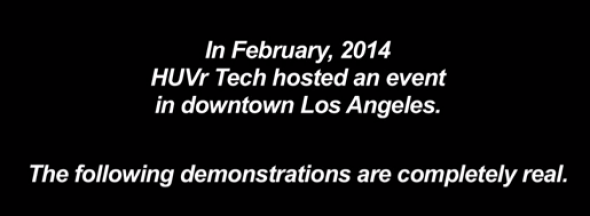Yes, Virginia, hoverboards are real. At least, that’s what this viral video would have you believe:
The commercial is so slickly produced, so laden with earnest celebrities, and so emphatic in its promises that the hoverboard is “real” that, for a moment, it almost convinced even me—and I, of all people, ought to know better. Even if the tech bloggers weren’t taken in—TechCrunch’s Darrell Etherington was among the first to debunk—it’s bound to hoodwink gullible kids around the world who want nothing more than to believe that they really can fly, through the miracles of science and technology.
Some hoaxes are funny. Some deftly satirize some aspect of our culture. Some, like the computer-generated gibberish papers that made it into scientific journals, cleverly expose dangerously low institutional standards.
But other hoaxes—and these disproportionately tend to fall into the “viral marketing stunt” category—amount to nothing but cynical exploitation of humans’ tendency to believe other humans when they say something is true. As my colleague Daniel Engber wrote of Jimmy Kimmel’s “twerk fail” hoax:
It’s a hostile, self-promoting act—a covert ad for Jimmy Kimmel Live—rendered as ironic acid that corrodes our sense of wonder. If the Web provides a cabinet of curiosities, full of freakish baubles of humanity, the hoaxer smashes it to bits, then counts his money while he preens atop the rubble.
That goes double for this one. Whatever the video’s intent, its primary achievement is to leave young people feeling a little more jaded than they were before. Is that really what you want, Christopher Lloyd?
A clever hoax invites you to believe; a bad one has to beg. This one crosses that line at precisely the 58-second mark, when it displays the following screen:

Screenshot / YouTube
It’s one thing to tell a gullible kid there’s a Santa Claus. This is more like telling her there’s a Santa Claus, and then saying, “No, seriously, I promise to you that I am not lying. Santa Claus is completely real.” And then bringing in celebrities, at huge cost, to attest to Santa Claus’s existence. And then, presumably, getting around to admitting that Santa is fake after all, and that the whole thing was a stunt to grab her attention so you could sell her something.
We don’t yet know exactly who orchestrated this video or to what end, although there are some clues. Some have speculated that it’s viral marketing for a new Nike product, Tony Hawk video game, Back to the Future Movie, or even a Back to the Future musical. Whatever it is, two things are clear: It’s not a hoverboard, and we’re not buying it—in any sense of the phrase.
Previously in Slate: